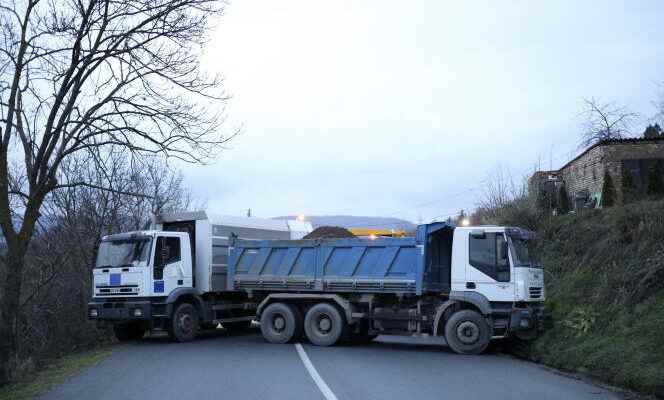Serbia will ask NATO for permission to deploy security forces in Kosovo, President Aleksandar Vucic said on Saturday, December 10, while adding that “no illusions” on the answer. The leader specified during a press conference that he would send a letter to this effect to the commander of the Kosovo Force (KFOR), led by NATO under a UN mandate, pursuant to the resolution of the Security Council that ended the Kosovo war (1998-1999).
Under the terms of the UN resolution, Serbia has the power to deploy up to 1,000 military, police or customs officers at Orthodox religious sites, in areas with a Serb majority and at border crossings, subject to the green light from KFOR. It would be the first time that Belgrade would make such a request.
Cascading resignations
Vucic’s announcement follows growing tensions in Serb-majority northern Kosovo. Hundreds of Kosovo Serbs had earlier in the day erected barricades on a road in the north of the country, blocking traffic at two major border crossings with Serbia, police said. In recent days there have been explosions, shootings and an attack targeting a police patrol, in which a Kosovar Albanian policeman was injured.
According to local media, protesters from Kosovo’s Serb minority are outraged by the arrest of a former policeman of Serb ethnicity suspected of involvement in attacks on Kosovo police.
The attack in which the policeman was injured on Thursday took place after the deployment in northern Kosovo of Kosovar Albanian policemen. According to the government, this deployment was decided after the collective resignation of Serbs working in public institutions, including the police. Serbian law enforcement officers and civil servants had resigned in protest at the Kosovo authorities’ decision to replace Serbian-issued license plates with Kosovo-issued ones.
The latest tensions erupted after the decision of the Kosovo authorities to organize on December 18, in the municipalities with a Serb majority, local elections which the main Serbian political parties have announced that they want to boycott. Explosions and gunfire were heard on Thursday as election officials visited two municipalities in northern Kosovo to prepare for the polls, but no injuries were reported. Shortly after the barricades were erected, Kosovo President Vjosa Osmani announced that she had decided to postpone local elections to April 23.
Kosovo’s Serb minority, totaling around 120,000, denies loyalty to Pristina with encouragement from Belgrade, which does not recognize Kosovo’s independence proclaimed in 2008, unlike the United States and most countries from Europe.
